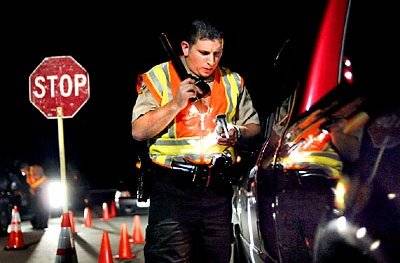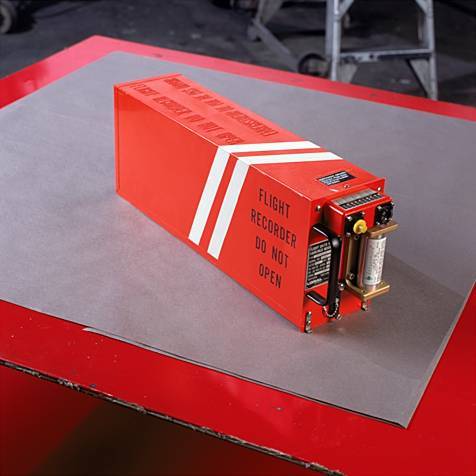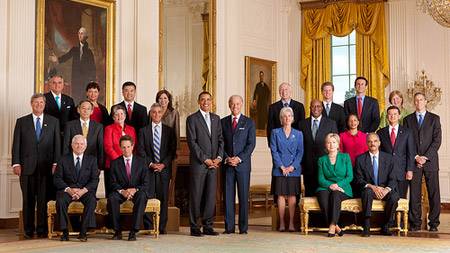
People confuse their cars with their homes.
I can understand that. They’re lounging in a reclining chair, talking on the phone, watching a movie and cramming salty foods into their fat faces.
Sometimes they fall asleep.
But the car is not the home. And when you steer your car on to public roads, you waive Constitutional rights enjoyed at home. Police can stop you without probable cause. Police can stop you without even particularized suspicion — just to see if you’ve been drinking.
It doesn’t matter whether your driving has been exemplary.(Michigan Department of State Police v. Sitz)
I’m very much in favor of Home-as-Castle. I think you should be able to do just about anything in your home. Smoke a doobie. Fondle another man’s balls. Sell him a blowjob! Burn the flag. Drink Canadian whiskey. Found your own privately funded, faith-based alternative school and teach your children gobbledygook.
These are not things I would do myself. I contend you have a right to do any of them on private property.
You never have the right to act dangerously among the public. Whatever you think — or viscerally feel — are your innate rights; they’re modified by the presence of others.
You do not have a right to drive.
 STOP IT BEFORE IT STARTS
STOP IT BEFORE IT STARTS
In this age, technology allows us to impose our collective will on one another. We can force ourselves to behave.
So it’s more important than ever that we correctly identify the proper balance of rights and responsibilities.
Effective laws contemplate human behavioral science. Instead of moralizing about how people should behave, effective legislators recognize how people do behave, and legislate accordingly.
The effective method for ending DUI is not to wag our collective finger at people and tell them they ought not drive drunk. Instead, make engine ignition reliant on a Breathalyzer.
No? Can’t get re-elected that way?
THE BLACK BOX
Incapacitation is key to ending distracted driving, too.
If we were serious about ending distracted driving, we’d make it impossible (or extremely expensive) to drive while chatting, texting, web-surfing, etc.
Unfortunately, there’s only one way to stop people from doing what they want to do: Impose draconian regulations.
A dashboard signal-jamming mechanism might impede legitimate uses of mobile phones. A transmission lock might idle your engine when your sister’s idiot boyfriend whips out his phone.
No, this is a case for Big Brother: install driver monitoring devices.
 A driver monitor could be as simple as a frequency detector which determines whether your phone was in use at the time of your fender bender.
A driver monitor could be as simple as a frequency detector which determines whether your phone was in use at the time of your fender bender.
A more advanced monitor would be an electronic eye/microphone combo to record the driver’s behavior. Like the Black Box of plane crash notoriety, this device could be removed and analyzed in the event of an incident.
Criminal proceedings might rely on evidence from such monitors. They’d find widespread use in civil courts, especially in determining comparative negligence.
You can bet that insurance company executives have already debated offering discounts to people who don’t own mobile phones.
LIBERALIZE ALCOHOL LAWS, TIGHTEN BAD BEHAVIOR LAWS
I don’t salivate at the prospect of imposing draconian laws on bad drivers. There’s simply no other way to ensure safe drivers.
If we’re serious about ending DUI and DWI (Driving while an Idiot — this can refer to texting, but also to mere vapid conversation) we’ll have to incapacitate any attempts to operate a motor vehicle while impaired.
To prove to the public that such drastic measures do not represent further encroachment by the nanny state, I recommend simultaneous repeal of most alcohol laws.
It’s crazy that you can’t buy liquor on Sunday because of someone else’s religion. It’s stupid that the second shift can’t go for a beer after work. It’s stupid that Illinois encourages, and in fact requires exclusive distribution monopolies of all alcohol beverages.
Illinois bans happy hour because legislators in Springfield got too drunk at lobbyist parties before driving home to the burbs.
The taxes here are outrageous.
Today 18-year-olds who scored 2390 on the SAT are criminals for drinking wine. But 21-year-olds can buy everclear regardless of educational milestones, convictions or past indiscretions.
Why do we punish good behavior? If kids could work toward a drinking license (pass a Constitution and civics test, get an ID) would we be better off?
Can you imagine teens cramming The Federalist Papers, parsing case law concerning the Privileges and Immunities clause, practicing mnemonic devices for remembering all the departments in the executive branch?
I tried one myself: Health? HIV, Deceast

Health and Human Services, Energy, Agriculture, Labor, Transportation, Homeland Security, Housing and Urban Development, Interior, Veterans Affairs, Defense, EPA, Commerce, Education, Attorney General (Justice), State, Treasury.
I suppose it’s a bit morbid.
Why not give kids incentives to educate themselves? They’ll all be drinking anyway, but they’ll have learned something worthwhile.
How much better would our country be if George Bush or Sarah Palin had studied American governance? How much better would our nation be if our citizenry — even the editors of local online magazines — had read the Constitution?
MANDATORY DRINKING BEFORE DRIVING?
In Poster Children’s “Accident Waiting to Happen” Rick Valentin (a teetotaler) sings “you think you drive better when you’re this way?!?!”
But a lot of people do drive better when they’ve had a couple. They’re less antsy. They’re really focused on the road because they totally do not want to get pulled over.
Should we require commuters to down a shot before leaving work?
What about other drugs? Psycho-pharmacology has created some powerful tranquilizers since our DUI laws were last updated. Do we reward people for popping pills that help them focus? Should we penalize them for it?
RATIONAL SELF-INTEREST: THE REAL REASON TO AVOID DWI
If drinking drivers get in an accident (even if it’s the other guy’s fault) they’re screwed. If they get pulled over for “fitting the description” they’re screwed. If some mechanical failure causes them to lose control of the car, they’re screwed.
It’s for these reasons that I don’t drive after drinking. Whether I’m perfectly capable (or more capable), I’m at a presumptive disadvantage in the eyes of the law. Since I earned my law license in 1998, I’ve been cautious.
Bad things happen in cars. And if the other party can demonstrate you had alcohol in your system, guess whom the jury will favor?
If you don’t care about others, do yourself a favor. Don’t drive while idiotic. It costs money.
In the final installment of this series, I’ll point out that people go ballistic when you start telling them what they can’t do. Just in case you didn’t know.








